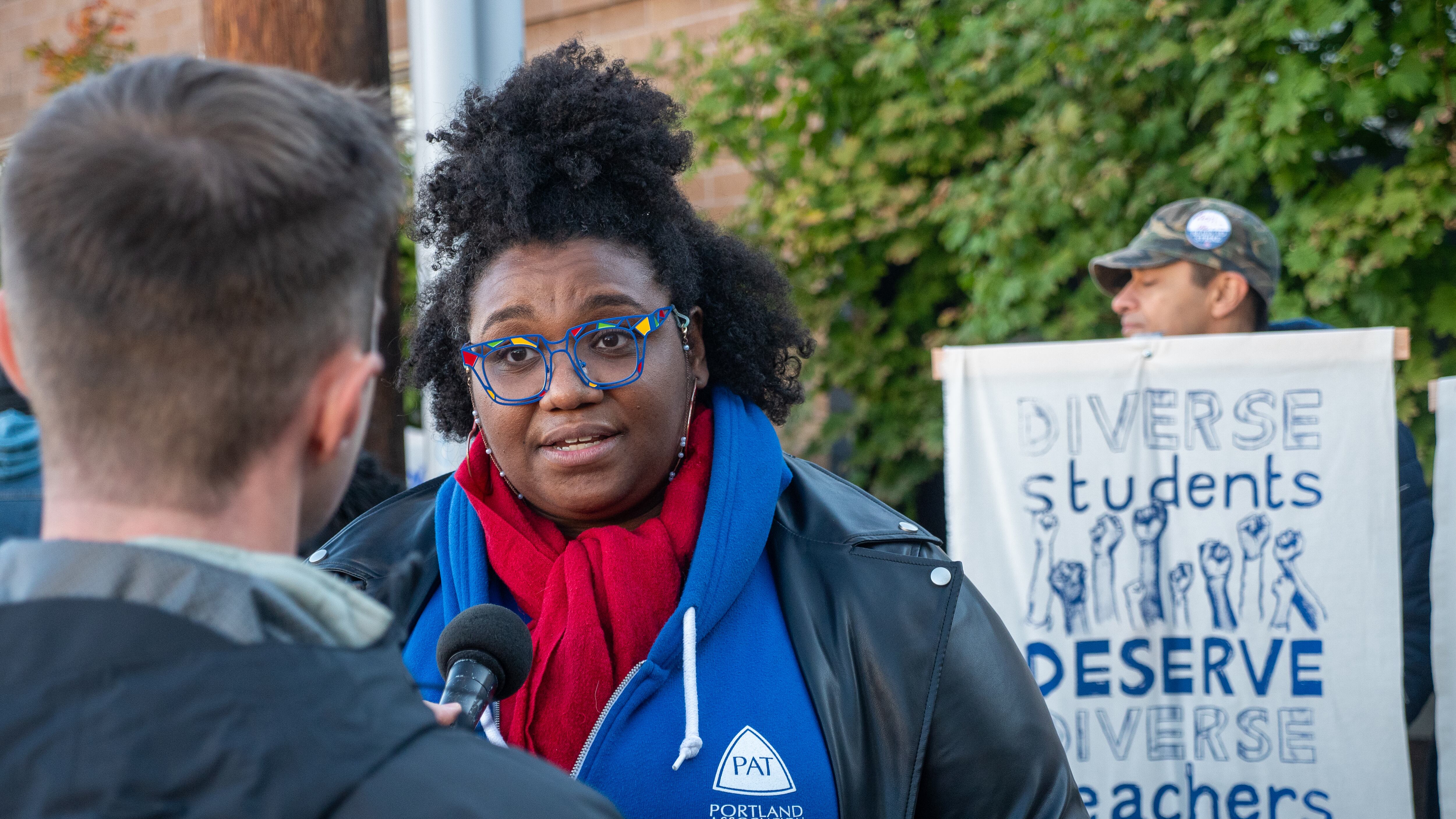In a letter obtained by WW, the top bargainer for the Portland Association of Teachers lambasted the union’s president, Angela Bonilla, for a series of what he describes as mistakes prior to and during the bitter Portland Public Schools teacher strike late last year that cost students 11 classroom days.
In the letter, Steve Lancaster, the union’s bargaining chair from 2014 through 2023, writes that union president Angela Bonilla bulldozed opposition within the union and made consequential decisions without input from other leaders, rushed into the strike when it might have been beneficial to wait until February, and prolonged the strike with her unwillingness to narrow demands. Lancaster’s criticism adds another layer of complexity to one of the most high-profile strikes in recent Oregon history.
Lancaster, a social sciences and psychology teacher at Lincoln High School who resigned as bargaining chair after the strike, wrote the six-page letter for a Jan. 27 post-strike review held by the Oregon Education Association, the statewide teachers’ union. That meeting brought together teachers’ union leaders from across the state.
Much of Lancaster’s criticism appears to be pointed at Bonilla, whom he never identifies by name. Bonilla, as WW wrote in a cover story last fall, rose quickly to head the PAT. Seemingly made for the spotlight, she’s smart, funny and energetic, with a successful history of organizing. But as the strike dragged on, idling 44,000 students and 3,500 teachers, criticism of Bonilla’s demands grew as they appeared increasingly unrealistic. (She was nonetheless reelected to another two-year term this week, having run unopposed for the top spot.)
In his letter, Lancaster describes several alleged instances in which Bonilla made key decisions—both in the days and hours leading up to the strike and during it—either without union input or, in some cases, despite pushback from other union leaders.
In one such alleged instance, just hours before the strike officially began, Lancaster wrote that Bonilla introduced a pagelong memo of additional demands that the union’s bargaining team hadn’t yet seen or vetted. Taken aback, Lancaster, as the bargaining team’s chair, says he convened a closed meeting of the team to discuss Bonilla’s last-minute additions. When Bonilla was invited back into the meeting, Lancaster alleges, she showed “extreme displeasure at not being in the room for the deliberations on the president’s proposal and demanded that no such meetings ever be held again.” (Lancaster also alleged that Bonilla created many of the union’s demands without proper input from union members.)
Lancaster also alleges that Bonilla made the decision to begin the strike Nov. 1 rather than Feb. 1. Opting for the later date, Lancaster argues, would have allowed the union to “build political pressure,” “increase the chance of coordinating bargaining with other work groups,” and align with the Oregon Legislature’s short even-year session.
In a statement to WW, Bonilla said that the union made decisions collectively and “debated, discussed, and voted on decisions.”
“We made decisions about the campaign leading up to, during, and concluding the strike through our elected officers, executive board, and school building leaders, along with the bargaining team,” Bonilla said. “We did this knowing those decisions would affect PAT’s 3,700 educators and the thousands of students and families we serve in order to win the best contract possible at a time when educators and public schools across the country are under attack. We welcome this feedback, and also recognize it comes from a single voice in a union of thousands.”
Bonilla added that the union would “continue to debrief with members throughout the union—particularly with those who have smaller platforms to share their feedback—and to implement our new contract gains in order to best serve our students and educators.”
Perhaps the most damaging allegation Lancaster makes is that Bonilla prolonged the duration of the strike by refusing to narrow the scope of the union’s demands as negotiations dragged on through November. “The ‘going for all of it’ approach contributed to management’s logical counter, which was to ‘give on nothing,’” Lancaster wrote.
“This gridlocked the bargaining and ensured that dozens of open issues remained on the table at the start of the strike,” he wrote, “when it would have been more advisable to have three to five key issues.”
The union and the district came to an agreement Nov. 26, nearly one month after teachers first walked out. Teachers negotiated a 13.8% cumulative cost-of-living increase over the next three years and received an increase in weekly planning time—little more than they could have gotten without striking—and eventually dropped most of their demands related to class-size caps.
Lancaster underlined that point, citing what he called a “lack of plausible financial strategy.” His observation: “It is critical to have a clear understanding of finances; misestimating the money available can lead to overreaching or leaving gains on the table,” Lancaster wrote. “The PAT and Uniserv staff believed PPS could afford the entirety of the $250 million+ proposal.”
He suggests the union develop a better understanding of district finances, seek better training for staff on financial analysis to help “ensure accurate costing of our own proposals,” and ask the Oregon Education Association to “provide support for local presidents on issues of democratic union governance.”
In the end, Lancaster concluded, “it seems that there was a large miscalculation on how much money it would be possible to extract from the PPS school board,” he wrote. “This strike revealed the limits of brute force tactics in compelling financial concessions from the employer.”

